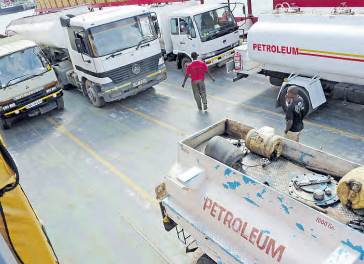

High taxes among them the recently
increased Road Maintenance Levy
and G-2-G oil purchase terms continue to deny Kenyans gains from lower
global prices.
The Energy and Petroleum Regulatory Authority (EPRA) on Tuesday raised pump prices of petrol, diesel and Kerosene by Sh0.29, Sh2 and Sh3 per litre, respectively, despite lower import costs, stable shilling and favourable global crude prices.
This has pushed up a litre of petrol in Nairobi to Sh176.58, Sh167.06 for diesel and Sh151.39 for kerosene, with consumers in Kenya continuing to pay more for petroleum products compared to Tanzania and Uganda, despite the latter being a landlocked country and imports most of its products through Kenya.
“The prices are inclusive of the 16 per cent VAT in line with the provisions of the Finance Act 2023, the Tax Laws (Amendment) Act 2024 and the revised rates for excise duty adjusted for inflation,” EPRA director general Daniel Kiptoo said.
Petrol and diesel are going for an equivalent of Kenyan shilling 117.54 and Sh98.25 per litre in Uganda, respectively, while fuel prices in Tanzania were at TZS 2,793 (Sh143.52 ) per litre of petrol, diesel TZS 2,644 (Sh135.87 ) and Kerosene TZS 2,676 (Sh137.51 ) per litre, as of January 1, 2025.
The price increases in Kenya came despite the landed cost of imported super petrol decreasing by 0.14 per cent from $612.53 (Sh79,322 ) per cubic metre in November 2024, to $611.69 (Sh79,213 ) in December 2024.
That of kerosene decreased by 1.62 per cent from $660.30 (Sh85,508 ) per cubic metre to $649.64 (Sh84,128 ) over the same period, with only diesel recording a slight increase of 0.06 per cent from $643.69 (Sh83,357 ) to $644.10 (Sh83,410 ).
Murban crude oil prices in the international market also remained at a low of $74.87 per barrel in December, and expected to maintain the same levels during the early parts of 2025. Prices for refined products recorded a drop during the period, data by EPRA shows.
The Kenyan shilling also remained stable against the US dollar averaging Sh129.58 when orders for the current cycle were being made, an improvement from Sh129.88 in November.
According to the World Bank, international crude oil prices are expected to be low in 2025 due to an oil glut.
The World Bank’s Commodity Markets Outlook report for October 2024 projects that Brent crude oil prices will average $73 per barrel in 2025, despite the conflict in the Middle East.
“Assuming the conflict does not intensify, the annual average price of Brent crude is expected to fall to a four year low of $73 in 2025,” World Bank said, down from $80.
Kenya is however tied to fixed premiums of between $88 and $90 per barrel under the government-to-government deal with Saudi Aramco, Abu Dhabi National Oil Corporation (Adnoc) and Emirates National Oil Company (Enoc), a deal entered in April 2023.
It allows the importation of fuel on a 180-day credit period in what was meant to help stabilise the shilling by ending the monthly demand of over $500 million that oil dealers needed to pay for fuel on the spot markets, under the former Open Tender System.
Kenya renegotiated the deal changing it from a fixed period to defined volumes of fuel, following the exit of Uganda.
Galana Energies, Gulf Energy and Oryx Energy were the initial local players before One Petroleum Ltd and Asharami Synergy joined them in the import business.
Other countries such as Malawi and Zambia, in a bid to ease supply disruptions caused by lack of enough dollars to pay for fuel imports, are replicating the model.
In December, a Cabinet meeting chaired by President William Ruto at State House Nairobi, extended the G-to-G arrangement.
“This arrangement has eased the monthly demand for US dollars for petroleum imports, stabilising the shilling-dollar exchange rate at Sh129 from a high of Sh166 and reducing pump prices from Sh217 per litre of petrol to Sh177,” the Presidency had said in a statement.
TAXES
Meanwhile, multiple taxes at the pump have kept fuel prices elevated with consumers paying nine different levies which currently amount to Sh80.91 on every litre of petrol, Sh69.20 on diesel while Sh55.09 on every litre of kerosene goes to taxes.
Among major one are the Road Maintenance Levy Fund (RMLF), which was in July last year increased by Sh7 per litre of petrol and diesel to Sh25, from Sh18.
The increase was intended to raise
more money for road maintenance
and repair. Others are VAT at between
Sh20.03 and Sh24.36, excise duty
(Sh11.37-Sh21.95 ) among others.











